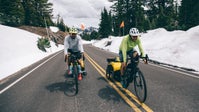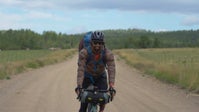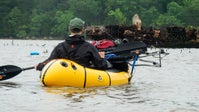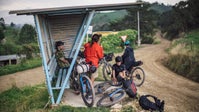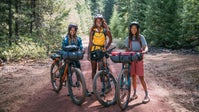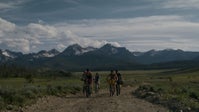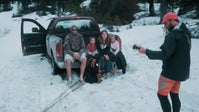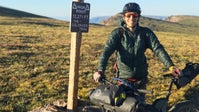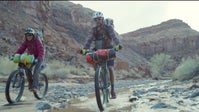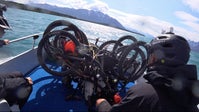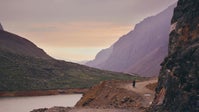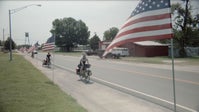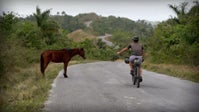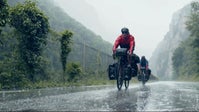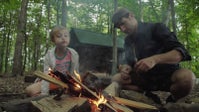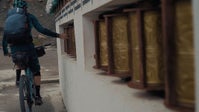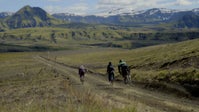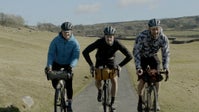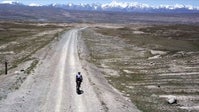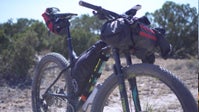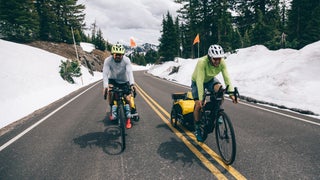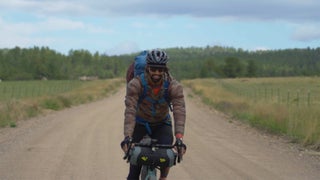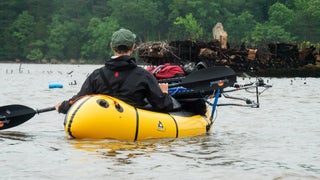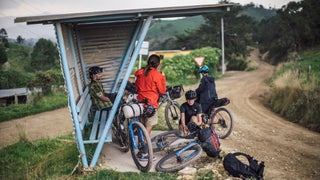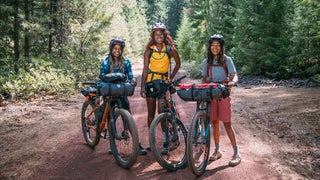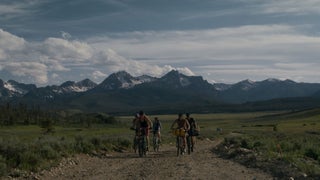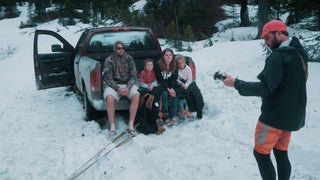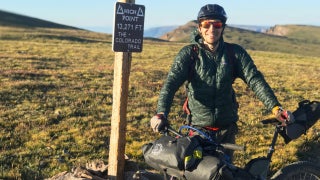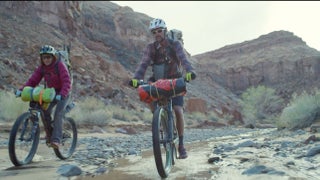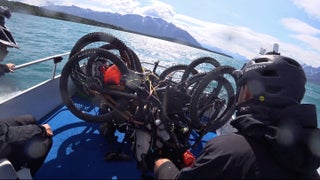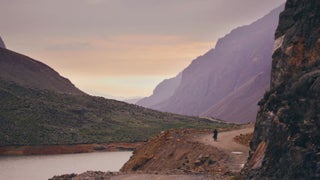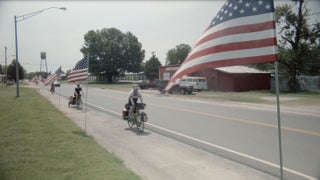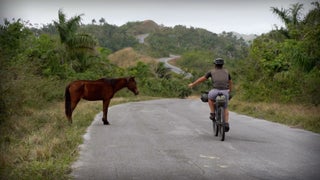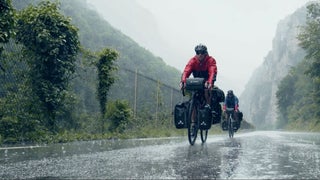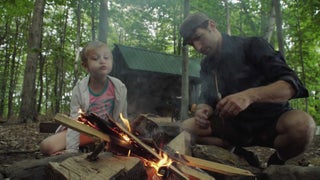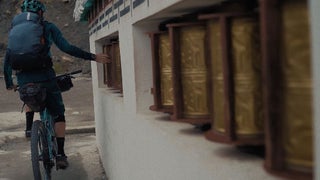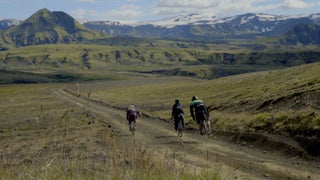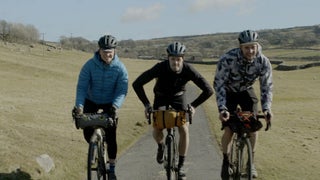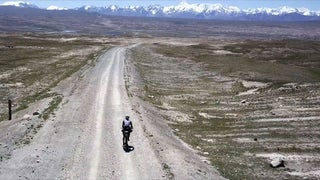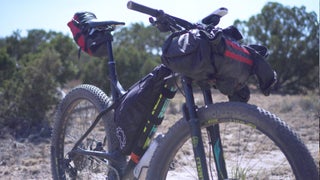BEN WEAVER: In one of my favorite stories, I rode my bike from St. Paul, where I lived, down the Mississippi to New Orleans. And that was the first really long trip that I did with the instruments and playing shows. And I was in Mississippi somewhere and went into this really blown-out gas station. And I carry my instruments on the back of the bike. And they kind of stick up like smokestacks and they look funny.
And this guy came up to me as I was packing my food up in my bike. And he goes where are you from? I said, Minnesota. And he goes, where are you going? And I said, New Orleans. He goes, I don't talk to crazy people.
[LAUGHTER]
And I knew then I was on to something because when people think you're crazy, then they listen to your stories. So.
[BIRDS CHIRPING]
SPEAKER 1: Excited to have Ben Weaver with us today. I don't know if you all know his story, but he is riding the Great Divide Mountain Bike Trail from Banff to the border of Mexico. And he's going to play some music for us. So can you all give a big round of applause and welcome Ben Weaver.
[APPLAUSE]
SPEAKER 2: This is huge because this is a 20th anniversary of one of the most iconic, currently the longest mapped mountain bike route anywhere in the world. 2,700 miles from Banff National Park in Canada, to the New Mexico-Mexico border. But to have Ben Weaver doing concerts all along the way, self-supported, it's just amazing.
KATHY KNAPP: What inspired you or drove you to put your life on hold and do this epic adventure, which is hard? I can't imagine riding a bike that long or walking that long.
BRETT DAVIS: Going down this historic route and giving back to the communities through your music and your talent, no one's done that.
CRICKET BUTLER: So it's so heavy.
SPEAKER 3: Ben's latest project is a special one as he is biking in the epic Great Divide Mountain Bike route to commemorate its 20th anniversary. Visit the link in the show notes for more information about the music for free on The Great Divide Mountain Bike Route.
BEN WEAVER: And we came around this corner and I see this Dodge pickup truck up to the wheel wells and snow. And there's a hand sticking out the driver's side and a hand sticking out the passenger side and smoke coming up from cigarettes. And these people were just stuck in their truck. They tried to drive over the pas. They had their kids with them. And they were just out for a Sunday ramble I think.
So we went past them. And I said to Keenan, I was, like, what if we go back and sing them a song? And he was, like, I think we should do that. So, we went back. And I'm in like-- I don't know-- I've got this crazy kit. I look like a pro wrestler from the '80s because it's neon orange and zebra print. And I said, hey, I've got a proposal for you. How about I sing you a song? He's like all right. So he got his whole family out of the car and they sat on the tailgate of the pickup truck. And I sing them a song.
[LAUGHTER]
[MUSIC - BEN WEAVER, "DOWNSTREAM"]
(SINGING) Light your fire by the river, sleep on the ground. Ramble, ramble, ramble, it's the only way back home. See the crows coming, tell your story to the smoke. What can't hold itself up on the land, I say, let it go. Great grandma, she hit a lightning bolt, an old workbench faces wood. Said there's a hole in the bucket, now you're here, we'll fix it good. Sister Chestnut wrapped some berries up in a torn piece of screen. She buried them under the porch so it wouldn't lose the seeds. Because we all-- we all live downstream. We all live down--
JESSICA FLYNN: Non-traditional. No-- no need to do what everyone else did, by any stretch of the imagination. If you didn't care about grades, and you didn't care about going to college, and that is the path so many people take. It was always hard to watch you take a different path. I know that the lifestyle of a musician is really difficult, but you persevered totally. And you never seem to doubt that this was what you were going to do.
BEN WEAVER: I'm very honored and happy to be here. I've been playing music for about 20 years now. And I spent 15 or so of that in the rat race of the music industry. And then about seven years ago, I ditched all of that because I wanted to do this. I wanted to ride my bike and I wanted to visit small towns and rural communities, because that's what my heart Is.
JEARLYN STEELE: You get Ben, you get his bike. Even if Ben is performing a concert hundreds of miles away, Ben Weaver is known for making tours around the Midwest riding his bike to his gigs.
SPEAKER 4: You're known as a traveling musician who uses a bike as your primary mode of transportation. You're known for really fostering a deep connection to the natural world.
ALEXANDRA HOUCHIN: I feel like you're inviting people to be wild.
BEN WEAVER: Yeah, right. It's an invitation to wildness. I mean, that's, I think, what it is. And that was what I wanted these shows to be, too. I wanted to like-- I wanted to give them away for free. Showing up on a bicycle with these instruments in a fluorescent orange, skintight kit, then playing songs is the weirdest invitation. You can do whatever you want. And that's like-- I think that's the other thing about the route that I really appreciated is that all of the people who live in those small communities, who have decided to make life how they want it to be.
THEODORA BRANNON: The neighbors are 10 miles away here. It doesn't have to be a geographical start and stop. And this community is absolutely amazing. And that's-- more than anything else, I think, besides all the natural beauty, it's the people. Some people have been so wonderful to me. And obviously, you know that.
BEN WEAVER: Yeah.
THEODORA BRANNON: That's just part of it.
BEN WEAVER: Yeah.
THEODORA BRANNON: That's most of it. You can live in a beautiful place in the world and everything can be perfect. And if the people that surround you aren't embracing you and if you can't embrace them, then it becomes a very lonely place. You can have beauty, but it's us. Yeah.
KATHY SCHOENDOERFER: We are on every end of the spectrum in this little town of 65 people you can come up with. And we love each other. And we will go to the-- we'll go way out in left field and right field for each other.
BILL DUNCAN: We all know each other. We're all neighbors. We don't always get along, but in the end, we back each other up. We might disagree with each other on cows, on fence lines, or water rights, but in the end, we all got the some goal in mind.
JOHN THOMAS: I find people are-- they might be a Hindu from India or might be somebody from somewhere else, but if I can communicate with them, I can find out they've got the same basic traits that I have.
KATHY KNAPP: - I tell them, if you go back far enough, we're all related. And everybody migrates to find a better life. And we're all connected.
VINCE KEATING: I think the one thing that keeps us together as humans or that it keeps us all unified is the necessity of things like a shelter or warmth or a bathroom or a shower. And for me to be able to offer that to the bikers and hikers, it keeps me in check, you know? I see so many different walks of life. We're all the same people. We all need the same basic necessities.
NITA LARRONDA If somebody doesn't receive, you can't give. And these people need my help, which is wonderful. And they don't understand, really, that by my giving, I'm receiving as much from them.
SPEAKER 5: Believing in people, it's good. I can't believe you're driving 31 days?
BEN WEAVER: What's that?
SPEAKER 5: I want 31 days off. I have a bike. Can I go with you guys?
[THUNDERSTORM]
SPEAKER 2: All right. So where are we, Ben?
BEN WEAVER: We're just getting over Huckleberry Pass. I think we're 10 or so miles, I don't know, outside of Lincoln, Montana, in an outhouse at a campground. It just like the infamous Tour Divide, The Great Divide Mountain Bike Route place to end up at least once. It's cold and it's raining. And that's about all I know right now. We're doing the best we can, living the dream.
[THUNDER CRASHES]
BILL MOORE: Your worst enemy is the rain. When it starts raining out there, that balls up in those tires, and it gets muddy.
BEN WEAVER: So this is that section that everybody warned me about or that you always see people getting stuck. Just it's always at the pace of the land. Doesn't really matter. So the pace of the land is not 20 miles an hour. It's definitely not 75 miles an hour. It's more like eight miles an hour.
JAY PETERVARY: I know what it took for you to get this far and put the project together and things. And then when you told me how many shows you were playing, I was, like, wow, that seems like a lot. God, man, this is just, like, such a hard thing already.
CHRIS ELBSON: It's been a hard ride. I mean I was expecting it to be hard, but it's bloody hard, it's not just hard. It's harder than you would ever imagine, the rain, the mud, the wind. And every time, it's hard. You just have to think of the reason why you're out.
ALEXANDRA HOUCHIN: I think something that's really important to remember is that we're all guests anywhere on this planet.
BILL MOORE: This piece of country out here is off the great basin, you know?
BEN WEAVER: Yeah.
BILL MOORE: Boy, that psychs people out. There's nothingness, but yet there's such a beauty out there. I mean, when you finally get in there, there's horses but people don't see them. They're like ghosts out there.
BEN WEAVER: (SINGING) One day I'll disappear into the lightning. Ride the river through the night. These are my hands in the water. Pulling diamonds from the dark. You see today could be a wild pony. Even if the wind never goes away. Where the rapids toss the timber. And the rain is pushing at my jaw. I find my heart in the open spaces where I once saw a beast slip through the fold. And I find my heart in the open spaces where closer I always want to be. Closer I always long to be.
So it's says it's 109 degrees now. This is my mermaid. My sweetheart gave me that. When I was on tour in Europe one time, I found all these like-- started collecting all these little rubber monsters and toys and put them on my piano every night. So when she gave me that, I thought I want to put that on my dashboard on my bike. But it's hot, holy freak, it's hot. I'm hot. I'm hot. I want to be in the shade a little bit I think. This mermaid needs some serious water.
ALEXANDRA HOUCHIN: Wow, I'm really-- I'm really, really a visitor here. It's reinforced that you're just a visitor. Out on the Tour Divide, you go through all these different eco regions, watersheds, communities, just so much different terrain. You have desert and you have snow.
WILL KATZ: You know, people are so far removed from being on the land. I really think it's like it's a gigantic burden and/or such an inconvenience that I want to stay far away from the discomfort that would give me. And there really isn't no discomfort. In fact, the other side of it is true which is, I mean, your mind wakes up. And you have elaborate Kodachrome dreams at night. And you'll lay there the first 20 minutes you're awake and wondering was that a dream or did I actually do that?
BEN WEAVER: This next song that I'm going to sing is a song that I wrote about something that's on my mind quite often, which is the difference between wildness and wilderness. And I think sometimes we confuse those two things. I think that wilderness is something that's very important, but I think wilderness is something that we make and that is managed and that is contained. And I think wildness is something much different than that. I think wildness is something that is inherent in an animal, and in a river, and in a human being. And I think if we run the risk of losing anything, we run the risk of losing our ability to relate to wildness. I think wildness is an endangered thing. So that's what the song is about.
[MUSIC - BEN WEAVER, "DIVIDED BY ANIMAL"]
(SINGING) The sky spins on, the moon borrows light divided by animal and absorbed in the trees. Whatever happens, that's all I ever want, while the rip rap leads toward the center of the wheel. But I ain't going back. I ain't going back there no more. Sing me towards home where the wind tastes like snow. I ain't going back.
There's always more fireflies if you cut across the field. The traveling and the unraveling, it all gets buried by worms. No one owns the bird song, the landscape sets the pace. There's space in the cracks if you need to slip away. But I ain't going back. I ain't going back there no more. Finally, I can see the moon now that the barn burned down. I ain't going back.
You could take my bones from the wild. You can't take the wild from my bones. I ain't going back. You take my bones from the wild. You can't take the wild from my bones.
KATHY KNAPP: I don't have any philosophical light bulb statements, but I know that people need to reconnect with their more natural state. When you disconnect, it's amazing how many thoughts go through your brain. What you said earlier about people needing nature, they need the wild.
And when you're away from civilization, you have to rely on you. You have to be the plan. You have to be the power. Until you put yourself out of your security and get somewhere you're not usually, you don't have to do that. Everything is done for you. Everything's programmable. And you can Google anything. But when you can walk away from this and you're forced to figure it out, it's empowering. It's healthy. It's healthy. And we don't do it. We have to make ourselves walk away. So I'm glad there are places like this still wild that people can go find their own answers.
BEN WEAVER: So part of my act is that I read a poem every night. This is a poem that I wrote about power. You could rake leaves while the glaciers melt and horses stand somewhere in a field with the sound of wind blowing rain into their manes. You could go to a job you don't love and live in a house you don't want and sit in traffic and feel trapped watching the eagles dive above the light poles and power lines. Or you could stop raking and lay down in the dirt with the leaves scattering around you smelling like the coming snow and the rattling ghosts of summer lightning. You could pick up a river and hold it to your eye, watch a turtle crawl through it, the light turbulent out of the sky beyond the bluffs.
Instead of serving these mad corporations and lawmakers oblivious to the dew on the pig's hindquarters at morning or the effort it takes ducks to find food after such a wet summer, you could sit around the fire next to the lake and listen as the water carries voices from a canoe out somewhere near the middle back to your camp along the stony shore. And as the fire licks at the red pines, you can uncover a memory that smells like moose hooves and orchids, wild rice hulls and trumpeter swans and helps if you remember the millions of invisible miracles which must occur within the sky so that a blizzard can become a blizzard.
This memory is what the mad kings and architects of the anthropomorphic rivers wants you to forget, because if you do not remember the smell or feel of the land, then you'll believe anything they tell you about it, including that it is just another body to exploit. But if you remember the sound of waves pulling back through the hair of beaches or the ring of a wind among icicles and sparrow caves, then you've not forfeited all of your freedom and power to the ruthlessness of modern convenience. And if you remember otters sliding across the lake at dusk or a bear rushing back into the alder, then you also remember that you were among the millions of tiny miracles within the sky that allow a blizzard to become a blizzard. And if you can remember this, then you could speak, sing, and dream loud as thunder for every quiet piece of land and water on this earth, because you have not forgotten that you, not the mad kings, are the one with power.
[GUITAR PLAYING]
(SINGING) With pine needles in my water, the tall trees at my back, I'm drawn away from the trodden places. See, I'm always doubling my tracks. But even left with empty pockets, she could find an agate any way. The upper stretches of the river are the upper stretches of my dreams. And I find my hears in the open places near the fork of a creek at the food of a hill. And I found my heart in the open places where closer I always long to be, where closer I always want to be.
